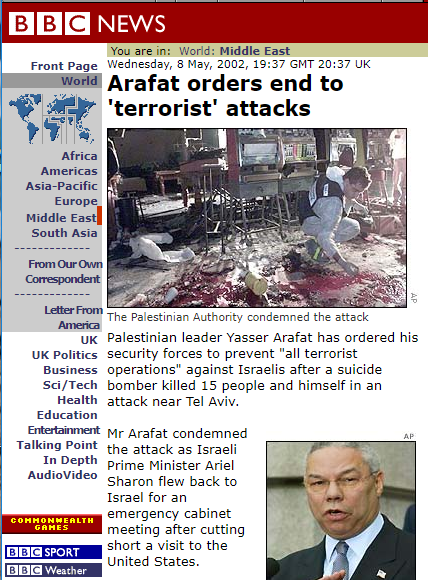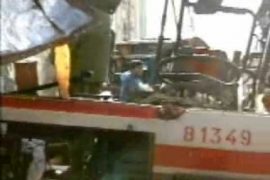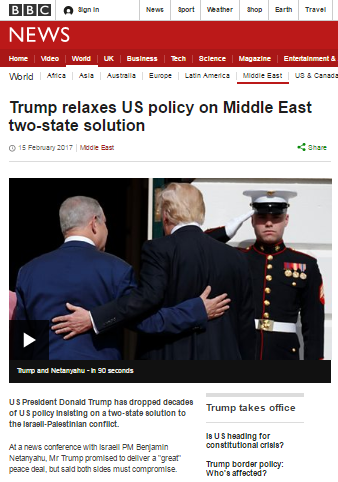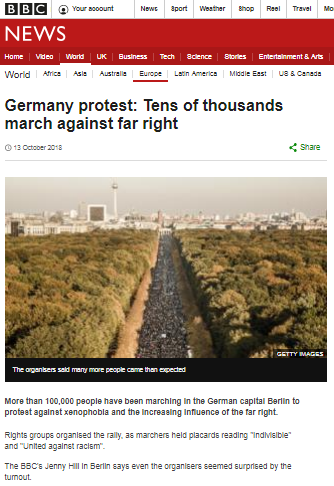Among the many BBC reports concerning the second Intifada which remain online and accessible to this day is one dated May 8th 2002 and carrying the interestingly punctuated headline “Arafat orders end to ‘terrorist’ attacks” in which readers are told that:
“Palestinian leader Yasser Arafat has ordered his security forces to prevent “all terrorist operations” against Israelis after a suicide bomber killed 15 people and himself in an attack near Tel Aviv.
Mr Arafat condemned the attack as Israeli Prime Minister Ariel Sharon flew back to Israel for an emergency cabinet meeting after cutting short a visit to the United States. […]
Amid growing expectations of Israeli reprisals, the Palestinian leader said he was ordering “the security forces to confront and prevent all terrorist operations against Israeli civilians from any Palestinian group”.
He said he was committed to the US-led fight against terrorism and appealed to the international community to help his forces “implement my order”.
Mr Arafat later appeared on Palestinian television and reiterated his call.”
Such framing is not limited to that specific report. In an article published the following month the BBC’s Martin Asser told audiences that:
“The Palestinian Authority leadership has frequently condemned the tactic of suicide bombings against Israeli civilians as a means of combating Israel’s occupation, saying such attacks harm the Palestinian cause, not help it.”
In a backgrounder published in February 2003 the BBC told its audiences that:
“The [Israeli] government accuses Mr Arafat of failing to contain militant groups like Hamas and Islamic Jihad which carry out many of the attacks. But analysts are now increasingly arguing that Mr Arafat is in no position to control them.”
A 2003 profile of Fatah’s Al Aqsa Martyrs’ Brigade informed readers that:
“Mr Arafat’s tacit backing for the brigade has also allowed Israeli officials to paint him as backing terrorism.”
Yasser Arafat’s actual role in instigating and directing the terror war known as the second Intifada has long been acknowledged by numerous Palestinian figures. The latest among them is Hamas’ Hassan Yousef who recently gave an interview which was translated by MEMRI.
“Hassan Yousef, one of the founders of Hamas in the West Bank, said in a July 12, 2019 interview on Al-Aqsa TV (Hamas-Gaza) that Hamas in the West Bank had been in constant communication with the office of Hamas leader Sheikh Ahmed Yassin in Gaza during the Second Intifada. Yousef said that his Ramallah office had been Hamas’ “door” to the Palestinian Authority, and he explained that whenever Hamas wanted something from Yasser Arafat, he was the person who passed it on to him. Yousef said that Hamas in the West Bank would comply with Arafat’s requests regarding operations during the Intifada, and he claimed that Palestinian national ties were at their peak during this time. Yousef also explained that Hamas had played a key role in the Second Intifada, saying that it met with the PA’s Force 17 and with other PA bodies in order to coordinate and plan operations. He added that every Palestinian city had national elements from Fatah and Islamic elements from Hamas that coordinated during the Intifada.” [emphasis added]
Like many additional second Intifada era BBC reports, those cited above – and others – were never subsequently labelled as carrying inaccurate and misleading information.
According to the BBC:
“The Editorial Guidelines state, “The archive of the BBC’s online content is a permanent public record and its existence is in the public interest. The online archive particularly news reports, should not normally be removed or amended.” To do so risks erasing the past and altering history.”
It is in fact the BBC which is “altering history” by maintaining an online archive which promotes inaccurate accounts of events without that fact being flagged up to users.
Related Articles:
Not fit for purpose: BBC backgrounder on second Intifada
BBC second Intifada backgrounders: ‘Sharon started it’
Myths and lethal narratives on the BBC website
Another lethal narrative on the BBC website




